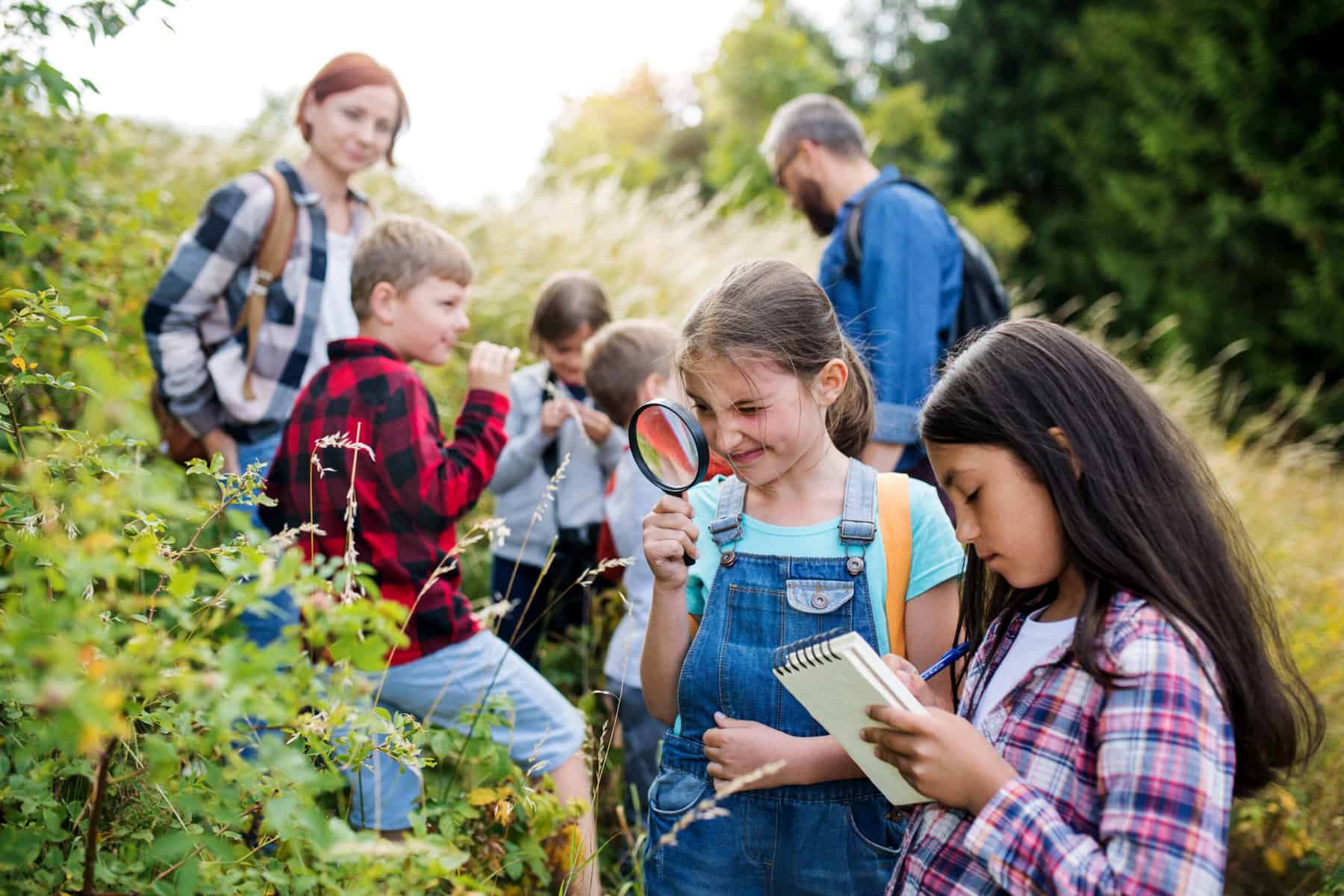Full-time RV living is become more and more popular with families. After all, what better way to become closer as a family and show your children the wonders of the world than to hit the road together?
However, despite the many obvious benefits of full-time living with kids, many folks are hesitant to jump on board due to feeling unsure about how to give their children a quality education while out on their adventure.
So, how are all these families providing their children with an education while exploring the world? For most folks the answer is roadschooling.
What is roadschooling?
Roadschooling is exactly what it sounds like: schooling on the road. In other words, roadschooling is homeschooling your kids while you travel.
However, Roadschooling is actually so much more. It is offering your children the opportunity to visit each of the fifty states as they learn their capitals; to actually see the Liberty Bell rather than only reading about it in dull history books; and to view, touch, and climb around the wonderful Grand Canyon during their study of the Native American tribes that once called the canyon home.
Roadschooling is touching, tasting, smelling, hearing, and seeing knowledge first-hand, and embracing learning as a lifestyle instead of a chore.
How can I get started roadschooling?
The answer to this question varies depending on what state you call home. While homeschooling is legal in all fifty states, the exact rules do vary from place to place.
Some states, such as Oklahoma and Texas, have very relaxed homeschooling laws, while others are much stricter and require end-of-year testing and proof of work completed.
In fact, depending on how you plan to roadschool and the laws in your current state, you may even want to consider changing your domicile state to one with homeschooling laws that better suit your family’s needs.
To get started with your roadschooling adventure, check out the homeschool laws for your state, and take whatever steps you need to take in order to legally homeschool your children. At this point, there is nothing left to do but choose your curriculum and get going.
Where do you store school supplies?
The answer to this question varies from person to person.
Some families do all schoolwork online and require very little in the way of physical materials, while others have an entire section of their RV dedicated to school supplies.
Still others take a very relaxed unschooling approach—a method of homeschooling that is very hands-off and child-led—and have a lot of materials that may not seem school-related, but are actually used for learning every day.
These materials are likely stored wherever they would normally store such items (should they not be considered school materials), with cooking tools in the kitchen, books on a shelf, and magnifying glasses in a tool box.
Our family falls somewhere in the middle of these three extremes.
We do have a small cabinet set aside for various manipulatives and learning materials, but we also take advantage of an online reading game as well as various “life lessons” in our day-to-day activities, both of which keep our collection of school supplies to a minimum.
All that said, the amount of school supplies your family has and where you store those items is completely up to you. If you prefer to live in the tiniest space possible, online schooling or unschooling may be the best options for you, as they require less in the way of physical supplies. If you wish to take a more traditional approach to schooling though, fifth-wheels and toy hauler RVs offer plenty of space for setting up a school nook that is large enough to hold everything you might need.
How do your kids make friends?
This question is asked time and time again.
The answer?
Everywhere!
Kids are excellent at making friends, and homeschooled kids actually have more opportunity to socialize when out in the real world than most kids ever have in a typical school day.
My son makes new friends at the park, in the campground, and even when grocery shopping.
Some we have kept in touch with, and as a result, my four-year-old has friends of all ages in a number of different states.
Honestly, there is no better way to make friends than RVing.
If your children are less outgoing, you might have to encourage them to make friends in the places you visit by sending them outside to ride bikes with the neighbor kids, taking them to the pool when you see kids swimming, and going to any campground-hosted events or activities.
However, as long as you stay in one place for a month or so at a time, you will almost certainly find some fellow full-time friends in each place you visit.
Although keeping in touch with friends while traveling does take a bit of extra effort, it also makes for great writing practice—pen-pals, anyone?—and could be good social media practice for older kids.
Additionally, meeting up with friends again after a period of time is always an exciting experience for kids, and great fun for the adults as well.
How do I know I am qualified to teach my kids?
Did you teach your kids to talk?
Did they learn to walk?
If so, you are already doing a great job, and you are definitely qualified to continue doing what you’ve always done: teach your children.
The truth of the matter is, you don’t have to be a genius, or even incredibly smart, to homeschool.
You only need to be able to find information, provide tools, and teach your children how to find information for themselves.
Whether you are taking the relaxed unschooling approach or a more traditional school-at-home approach, as long as you can provide your children with a loving and supportive environment and the materials they need to learn and grow, you can roadschool.
For some families, this might mean exploring the campground, taking pictures of lizards, and researching the lizards you find together.
For others it could mean handing your kid a math book and signing them up for online tutoring. Both methods—or even a combination of the two—are totally acceptable, and one method could work better for one family than another.
The point is to find what works for your family, stick with it, and remember that as long as you are raising kind, thoughtful, and genuinely curious individuals who know how to find the information they need to do what they want to do, you are doing it right.
Will roadschooling hurt my children in the future?
No matter how you raise your children, there is the potential to screw up. This is true whether your kids go to public school, attend a prestigious private school, or receive an education on the road.
For many people, homeschooling is a scary step outside of the box.
However, it is important to remember that attending public school does not guarantee your child a good job, admission to a great college, or even a true education.
In fact, homeschooled children are easily some of the most intelligent and unique individuals I have ever had the pleasure of meeting, and I have never met a formerly homeschooled adult who resented their parents for making the decision to homeschool them.
Additionally, homeschoolers—yes, even the unschooled ones—have consistently high test scores, and while I don’t put much stock in tests, I do have to say that this has to mean something positive.
So no, roadschooling will not hurt your child, and it can even give them a leg up in the competitive adult world if you do it right.
Where can I find curriculum, and how do I choose?
Choosing curriculum is a very personal process.
Some people prefer to visit huge curriculum fairs and look through various options, while others go by the advice of friends and order online.
Many people piece together their own curriculum, and a huge majority of roadschoolers use at least some online lessons or supplements.
My best advice for finding what is right for your family is to first work with your child using free resources to get a feel for how they learn best.
Free printables and unit study plans can be found online via a simple Google search.
There are also a wide variety of free educational online games and apps available, and free reading material can always be found at the library.
Once you have a good idea how your child learns best, look around online, read reviews, and look at sample lessons and pages.
Curriculum can be quite expensive, so it is important to do plenty of research before purchasing anything.
In addition to whatever curriculum you choose to use, be sure to use your travels to your advantage by tying them into your schooling.
Visiting historic sites, national parks, and other places of note will help expand upon your children’s schooling and keep them curious and interested in the world around them.
Roadschooling Resources
There are tons of amazing resources out there for roadschoolers. Below, we have put together a list of our favorites.
— Planning Resources:
- check
— Popular curriculum and supplemental options:
Chelsea Gonzales
Chelsea enjoys full time RV living and traveling — and trying new coffee shops wherever she goes — with her husband and 4 year old son. Her other hobbies include riding bikes, singing, dancing, acting, and reading. Her personal blog can be found at Wonder Wherever We Wander



